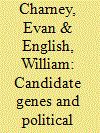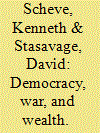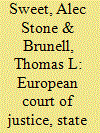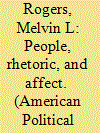|
|
|
Sort Order |
|
|
|
Items / Page
|
|
|
|
|
|
|
| Srl | Item |
| 1 |
ID:
113540


|
|
|
|
|
| Publication |
2012.
|
| Summary/Abstract |
Political scientists are making increasing use of the methodologies of behavior genetics in an attempt to uncover whether or not political behavior is heritable, as well as the specific genotypes that might act as predisposing factors for-or predictors of-political "phenotypes." Noteworthy among the latter are a series of candidate gene association studies in which researchers claim to have discovered one or two common genetic variants that predict such behaviors as voting and political orientation. We critically examine the candidate gene association study methodology by considering, as a representative example, the recent study by Fowler and Dawes according to which "two genes predict voter turnout." In addition to demonstrating, on the basis of the data set employed by Fowler and Dawes, that two genes do not predict voter turnout, we consider a number of difficulties, both methodological and genetic, that beset the use of gene association studies, both candidate and genome-wide, in the social and behavioral sciences.
|
|
|
|
|
|
|
|
|
|
|
|
|
|
|
|
| 2 |
ID:
113543


|
|
|
|
|
| Publication |
2012.
|
| Summary/Abstract |
In this article we use an original data set to provide the first empirical analysis of the political economy of inherited wealth taxation that covers a significant number of countries and a long time frame (1816-2000). Our goal is to understand why, if inheritance taxes are often very old taxes, the implementation of inheritance tax rates significant enough to affect wealth inequality is a much more recent phenomenon. We hypothesize alternatively that significant taxation of inherited wealth depended on (1) the extension of the suffrage and (2) political conditions created by mass mobilization for war. Using a difference-in-differences framework for identification, we find little evidence for the suffrage hypothesis but very strong evidence for the mass mobilization hypothesis. Our study has implications for understanding the evolution of wealth inequality and the political conditions under which countries are likely to implement policies that significantly redistribute wealth and income.
|
|
|
|
|
|
|
|
|
|
|
|
|
|
|
|
| 3 |
ID:
113545


|
|
|
|
|
| Publication |
2012.
|
| Summary/Abstract |
We use a formal theoretical framework to explore the interplay between a government's longevity and its performance. Ministers perform well when their careers are valuable; this is so when the government's duration is expected to be long; the government's survival depends on its popularity; and, finally, that popularity depends on its ministers' performance. The feedback loop between performance and longevity means that multiple rational-expectations equilibria can arise: Ministers work hard for a popular government, but divert efforts elsewhere if they believe the government is doomed; these alternatives are both self-fulfilling prophecies. However, the presence of (perhaps small) random events that buffet the performance and popularity of a government is sufficient to pin down a unique equilibrium. We explore the dynamics that arise: A crisis of confidence involving the rapid collapse of a government's performance is sparked when a sequence of negative shocks push the popularity of the government below a unique critical threshold.
|
|
|
|
|
|
|
|
|
|
|
|
|
|
|
|
| 4 |
ID:
113542


|
|
|
|
|
| Publication |
2012.
|
| Summary/Abstract |
The effects of inequality and financial globalization on democratization are central issues in political science. The relationships among economic inequality, capital mobility, and democracy differ in the late twentieth century for financially integrated autocracies vs. closed autocracies. Financial integration enables native elites to create diversified international asset portfolios. Asset diversification decreases both elite stakes in and collective action capacity for opposing democracy. Financial integration also changes the character of capital assets-including land-by altering the uses of capital assets and the nationality of owners. It follows that financially integrated autocracies, especially those with high levels of inequality, are more likely to democratize than unequal financially closed autocracies. We test our argument for a panel of countries in the post-World War II period. We find a quadratic hump relationship between inequality and democracy for financially closed autocracies, but an upward sloping relationship between inequality and democratization for financially integrated autocracies.
|
|
|
|
|
|
|
|
|
|
|
|
|
|
|
|
| 5 |
ID:
113544


|
|
|
|
|
| Publication |
2012.
|
| Summary/Abstract |
Studies of Organisation for Economic Co-operation and Development (OECD) countries have generally failed to detect real economic expansions in preelection periods, casting doubt on the existence of opportunistic political business cycles. We develop a theory that predicts that a substantial portion of the economy experiences a real decline in the preelection period if the election is associated with sufficient policy uncertainty. In particular, policy uncertainty induces private actors to postpone investments with high costs of reversal. The resulting declines, which are called reverse electoral business cycles, require sufficient levels of polarization between major parties and electoral competitiveness. To test these predictions, we examine quarterly data on private fixed investment in ten OECD countries between 1975 and 2006. The results show that reverse electoral business cycles exist and as expected, depend on electoral competitiveness and partisan polarization. Moreover, simply by removing private fixed investment from gross domestic product, we uncover evidence of opportunistic cycles.
|
|
|
|
|
|
|
|
|
|
|
|
|
|
|
|
| 6 |
ID:
113549


|
|
|
|
|
| Publication |
2012.
|
| Summary/Abstract |
In an article previously published by the APSR, Carrubba, Gabel, and Hankla claim that the decision making of the European Court of Justice (ECJ) has been constrained-systematically-by the threat of override on the part of member state governments, acting collectively, and by the threat of noncompliance on the part of any single state. They also purport to have found strong evidence in favor of intergovernmentalist, but not neofunctionalist, integration theory. On the basis of analysis of the same data, we demonstrate that the threat of override is not credible and that the legal system is activated, rather than paralyzed, by noncompliance. Moreover, when member state governments did move to nullify the effects of controversial ECJ rulings, they failed to constrain the court, which continued down paths cleared by the prior rulings. Finally, in a head-to-head showdown between intergovernmentalism and neofunctionalism, the latter wins in a landslide.
|
|
|
|
|
|
|
|
|
|
|
|
|
|
|
|
| 7 |
ID:
113547


|
|
|
|
|
| Publication |
2012.
|
| Summary/Abstract |
Spectacular economic growth in China suggests the ruling Chinese Communist Party (CCP) has somehow gotten it right. A key hypothesis in both economics and political science is that the CCP's cadre evaluation system, combined with China's geography-based governing logic, has motivated local administrators to compete with one another to generate high growth. We raise a number of theoretical and empirical challenges to this claim. Using a new biographical database of Central Committee members, a previously overlooked feature of CCP reporting, and a novel Bayesian method that can estimate individual-level correlates of partially observed ranks, we find no evidence that strong growth performance was rewarded with higher party ranks at any of the postreform party congresses. Instead, factional ties with various top leaders, educational qualifications, and provincial revenue collection played substantial roles in elite ranking, suggesting that promotion systems served the immediate needs of the regime and its leaders, rather than encompassing goals such as economic growth.
|
|
|
|
|
|
|
|
|
|
|
|
|
|
|
|
| 8 |
ID:
113548


|
|
|
|
|
| Publication |
2012.
|
| Summary/Abstract |
In recent decades, the concept of "the people" has received sustained theoretical attention. Unfortunately, political theorists have said very little about its explicit or implicit use in thinking about the expansion of the American polity along racial lines. The purpose of this article in taking up this issue is twofold: first, to provide a substantive account of the meaning of "the people"-what I call its descriptive and aspirational dimensions-and second, to use that description as a framework for understanding the rhetorical character of W.E.B. Du Bois's classic work, The Souls of Black Folk, and its relationship to what one might call the cognitive-affective dimension of judgment. In doing so, I argue that as a work of political theory, Souls draws a connection between rhetoric, on the one hand, and emotional states such as sympathy and shame, on the other, to enlarge America's political and ethical imagination regarding the status of African-Americans.
|
|
|
|
|
|
|
|
|
|
|
|
|
|
|
|
| 9 |
ID:
113546


|
|
|
|
|
| Publication |
2012.
|
| Summary/Abstract |
Given their political incentives, governments in more autocratic polities can strategically channel unearned government and household income in the form of foreign aid and remittances to finance patronage, which extends their tenure in political office. I substantiate this claim with duration models of government turnover for a sample of 97 countries between 1975 and 2004. Unearned foreign income received in more autocratic countries reduces the likelihood of government turnover, regime collapse, and outbreaks of major political discontent. To allay potential concerns with endogeneity, I harness a natural experiment of oil price-driven aid and remittance flows to poor, non-oil producing Muslim autocracies. The instrumental variables results confirm the baseline finding that authoritarian governments can harness unearned foreign income to prolong their rule. Finally, I provide evidence of the underlying causal mechanisms that governments in autocracies use aid and remittances inflows to reduce their expenditures on welfare goods to fund patronage.
|
|
|
|
|
|
|
|
|
|
|
|
|
|
|
|
| 10 |
ID:
113550


|
|
|
|
|
| Publication |
2012.
|
| Summary/Abstract |
In 2008 we published an article finding evidence for political constraints on European Court of Justice (ECJ) decision making. Stone Sweet and Brunell (this issue) argue that our theoretical foundations are fundamentally flawed and that our empirical evidence supports neofunctionalism over intergovernmentalism "in a landslide." We respectfully disagree with Stone Sweet and Brunell regarding both their conclusions about our theoretical arguments and what the empirical evidence demonstrates. We use this response to clarify our argument and to draw a clearer contrast between our and their perspective on the role the ECJ plays in European integration. Finally, we reevaluate their neofunctionalist hypotheses. Ultimately, we do not find support in the data for Stone Sweet and Brunell's empirical claims.
|
|
|
|
|
|
|
|
|
|
|
|
|
|
|
|
| 11 |
ID:
113541


|
|
|
|
|
| Publication |
2012.
|
| Summary/Abstract |
Natural experiments help to overcome some of the obstacles researchers face when making causal inferences in the social sciences. However, even when natural interventions are randomly assigned, some of the treatment-control comparisons made available by natural experiments may not be valid. We offer a framework for clarifying the issues involved, which are subtle and often overlooked. We illustrate our framework by examining four different natural experiments used in the literature. In each case, random assignment of the intervention is not sufficient to provide an unbiased estimate of the causal effect. Additional assumptions are required that are problematic. For some examples, we propose alternative research designs that avoid these conceptual difficulties.
|
|
|
|
|
|
|
|
|
|
|
|
|
|
|
|
|
|
|
|
|